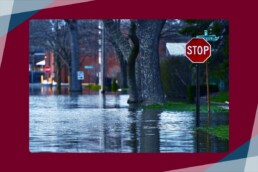What Is Considered an “Act of God” in Insurance?
A lot of images come up when we hear the phrase “act of God.” Also, depending on who you ask, personal explanations of the phrase can differ a great deal.
Some people might think that everything is an act of God, while others may see no place for a God of any kind in their lives. Fortunately, an act of God in insurance terms has a little more certainty.
If you’re a little confused when you see “act of God” on your insurance policies, we’re here to help clear things up. We’re going to talk about the legal definition of an act of God today, giving you some idea what it means in your insurance policies.
What Is An Act of God In Insurance?
The “act of God” phrase was used a lot more in the past in legal policies and documentation. When you put a magnifying glass to the phrase and run it through all potential insurance claims, it shows a few cracks.
Generally, an act of God is anything caused by nature itself. Flood damage, earthquake damage, tornadoes, and natural disasters fall into this broad definition.
There’s no reference to any belief system here. “God” simply refers to things outside the control of human activity. The challenge in understanding this legal term, though, is drawing the line between controllable and uncontrollable events.
For example, what’s a reasonable amount of prevention? At what point could a person have mitigated damage? Should a person sacrifice one thing to protect another for the sake of insurance?
Say that you were expecting a massive storm to pass through the area around your coastal home. You’ve got a boat docked there as well. The news comes quickly, and you do what you can to safeguard your home with the time you have.
You could have spent that time removing and transporting your boat, but you chose to protect your home. Was damage to your boat preventable? At what cost?
Force Majeure Clauses
A force majeure is a force that’s superior or irresistible. Force majeure clauses lift personal liability to prevent or mitigate damage in the face of uncontrollable and unpredictable circumstances.
Any catastrophe that comes your way is most likely unavoidable except in very rare cases. These clauses also apply to non-natural situations. Armed conflict, for example, would be considered a force majeure because there’s nothing the individual could be reasonably expected to do in terms of prevention.
Even with the extended definition of these clauses, there are still some gaps that one could argue over. For example, at what point can you expect a storm?
Would it be reasonable for someone to expect the scope of the pandemic? As climate change hurdles our way, should we expect catastrophic storms and do our best to mitigate property damage?
These are questions that don’t always have answers, and the fortunate thing is that we don’t need those answers with insurance. Three general rules apply to acts of God.
If the situation ticks each box, it qualifies as a force majeure. Let’s look at these three qualifiers.
1. Unforeseeable
The first requirement is that the event is unforeseeable to the insured party. Most natural disasters and catastrophes fall into that category automatically. That said, there could be an issue if there’s precedent.
If similar events have occurred for other individuals with policies like yours, you might have some liability in the policy. If there are special circumstances, though, the policy needs to list them.
If you live in an area that’s had regular floods, for example, flood damage could be considered foreseeable.
2. External to The Parties of The Contract
The next requirement is that the factors of the event are external to the parties in the contract.
The insured must not play a significant part in the catastrophe at hand. Imagine that you owned a manufacturing plant in a mountainous, snowy area. You nestled your factory in the most picturesque place possible for the sake of branding.
A few months into production, the noise and activity in your plant causes a serious avalanche that does a lot of damage. In that instance, you wouldn’t be an external party because you played a direct role in causing the catastrophe.
That wouldn’t be an “act of God.” The same would be true if you incurred water damage while tinkering with your plumbing.
3. Irresistible or Unavoidable
Finally, the “act” has to be unavoidable. There’s nothing you can do about it, and there’s no way for you to avoid it.
You can’t move your home out of the way of an enormous hurricane, so it’s unavoidable. You can’t resist floodwaters seeping through your foundations and causing damage.
Something that is resistible is hard to define. Again, the context of the situation matters, and the law tends to mean what they could reasonably expect a person to do. Think back to our example of the house and the boat.
Most of the time, there’s nothing you can do to prevent catastrophes or mitigate acts of God. Unless you have a large company that’s contributing to different catastrophic risk factors, there’s not a lot to worry about.
The key thing is that the individual does what they can reasonably do to prevent damage if possible, but there’s very little to be done in most cases.
What Does Your Insurance Cover?
If you’re wondering about an act of God in insurance terms, you must speak with a professional. There’s a lot more to learn about what your property insurance covers, what to look out for, and how to deal with issues when they come up.
We’re here to help. Contact us to talk about getting great insurance and understanding any of the details you might have questions about.
Related Articles
Homeowners Insurance in NJ: A Comprehensive Guide
Key Takeaways Homeowners insurance in NJ protects your home, personal property, and liability, making it essential for safeguarding your investment. Annual…
What You Need to Know About Flood Insurance in NJ
Key Takeaways Flood insurance is essential for New Jersey homeowners, even those outside high-risk zones, as flooding can occur anywhere from various sources…


